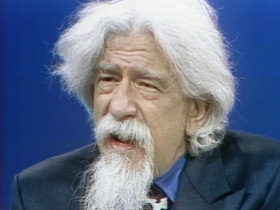
It is always a good time to think about, to read, and now to watch Abraham Joshua Heschel. There is even a better reason now. There is a new film, just out from Journey Films, directed and produced by Martin Doblmeier, Spiritual Audacity: The Abraham Joshua Heschel Story.
“What manner of man is the prophet?,” asks Abraham Joshua Heschel, in the opening words of his 1962 masterwork The Prophets. Heschel tells us. The prophet has an acute sensitivity to evil. Acts that others might dismiss with a shrug, or explain away as the dog-eat-dog way of the world, incite the full fury of their indignation at what Heschel calls “the secret obscenity of sheer unfairness.” This the prophet feels fiercely, a sensitivity to evil that is a divine illness. They know that God has placed a burden on their shoulders, and thrust a coal into their mouths. The prophet feels the pathos of God, and becomes its vessel. The prophet is an iconoclast, a breaker of images, a seeker of holiness who has no patience or tolerance for its feigned imitations or facsimiles, an unwelcome guest in the Temple. The prophet decries evil and the pollution of the divine word, but is aware that to castigate only the wicked lets everyone else off the hook, and in Heschel’s famous words, “few are guilty, all are responsible.” All misdemeanors become felonies. But in this refusal to accept gradations of accountability they are insisting on our linked fates, that God is less interested in the fate of individuals than our collectivities, our communities, cities, and nations. Prophets are bringers of both comfort and wrath. And so while prophets are not sentimental, they are compassionate, recognizing human shortcomings and limitations, and that because of this, our shared fate will never eliminate desperation and suffering.